
A Guide On Using Aquaponics To Grow Cannabis
Aquaponics combines hydroponics and aquaculture into a self-sustaining ecosystem that can grow some truly superb cannabis. Find out about aquaponics and how to easily set up your own system at home.
Aquaponics is a fantastic way to grow cannabis that combines the advantages of hydroponics with fish farming. It’s a great method if you’re looking to deviate from the standard soil grow, and not just because it’s especially cool-looking and will impress your friends.
With a good aquaponics setup, you are essentially creating a self-sustaining ecosystem where the fish and your cannabis form a symbiotic relationship. If you’re thinking that sounds complicated, fear not, because it’s not that difficult to do.
In this guide, we’ll let you know how you can set up your own DIY aquaponics system in just a few steps. Much coolness and great cannabis ahead!
What Is Aquaponics?
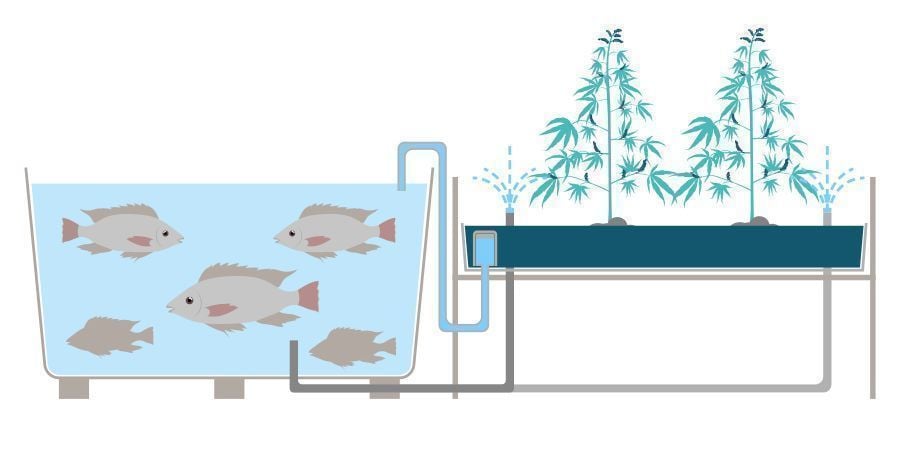
Aquaponics is a combination of aquaculture and hydroponics. Like the latter, it involves growing cannabis in a soilless (or mostly soilless) medium where nutrients are administered via a water pump—only this time, we’re putting fish to work.
It essentially works like this: The fish eat and produce waste (ammonia), which bacteria break down into nitrates. A pump then carries this nutrient-rich water to a grow bed containing your plants. The plants take up nitrogen via the roots, and, in doing so, also clean the water, which is then returned to the fish in the tank.
Thus, your aquaponics system forms a continuous cycle just like Mother Nature does in a natural aquatic ecosystem: Fish feeding on bacteria, bacteria breaking down fish poop (which turns it into plant food), and plants cleaning the water for the fish. This makes aquaponics one of the most sustainable and cost-effective farming systems.
Why Grow Cannabis Using Aquaponics?
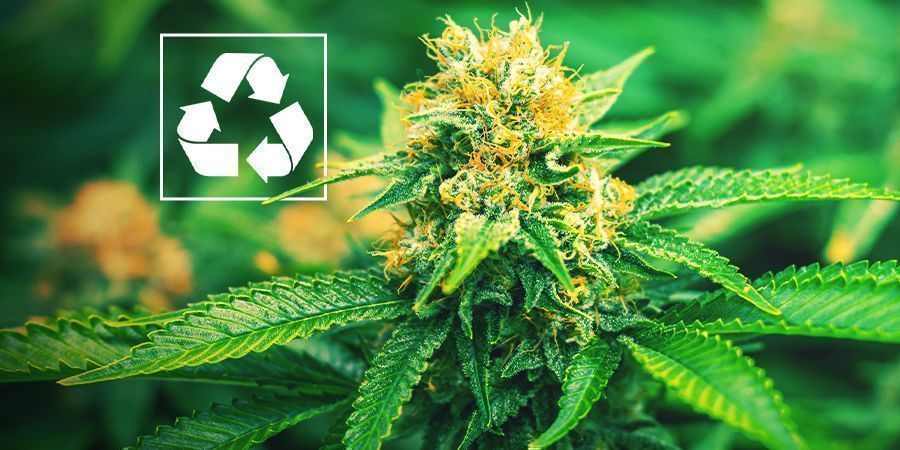
Along with being almost completely self-sustainable, which is obviously its biggest appeal, growing with aquaponics has a lot more perks (and just a few cons). Let’s take a look:
Aquaponics Pros:
-
Completely organic and natural: With fish in your tank, you can’t use harmful chemicals. And growing organically and naturally won’t just keep your fish healthy and happy, but your plants too!
-
Uses less water than other growing methods: Unlike traditional hydroponic methods like deep water culture, you require much less water overall for an aquaponics setup. While you'd have to replace your water every three weeks or so for DWC, aquaponics is much more self-sustaining. You'll only need to top up water lost to evaporation.
-
Can be set up virtually anywhere: You can set up an aquaponics system indoors, outdoors, or in a greenhouse.
-
Can be scaled up or down: An aquaponics setup can be small enough for a couple of plants, or as large as you want.
-
It requires less time: As the system is largely automated, it requires less time and effort than other gardening methods. Ideally, all you’ll need to do is feed your fish.
-
It looks cool: Fish and cannabis make an awesome combo.
-
It's good for growers who simply want to try something different.
Aquaponics Cons:
-
Not the easiest or quickest growing method to set up.
-
May require time to adjust the system so it does in fact become entirely self-sustaining.
How to Set Up an Aquaponics System
Now, we can discuss how to actually set up a basic aquaponics system for yourself. Our system won’t just be using clay pebbles for the growing medium, though. Instead, we’ll be using a “dual root zone” setup.
The reason? Clay pebbles alone won’t provide enough nutrients to supplement what’s provided by the fish and microbes. As a result, such a system is often low on potassium and phosphate. With the dual root zone, we add in a soil layer that boosts nutrients to the optimal levels.
Here’s how to do it:
1. Put Your Fish Tank Together
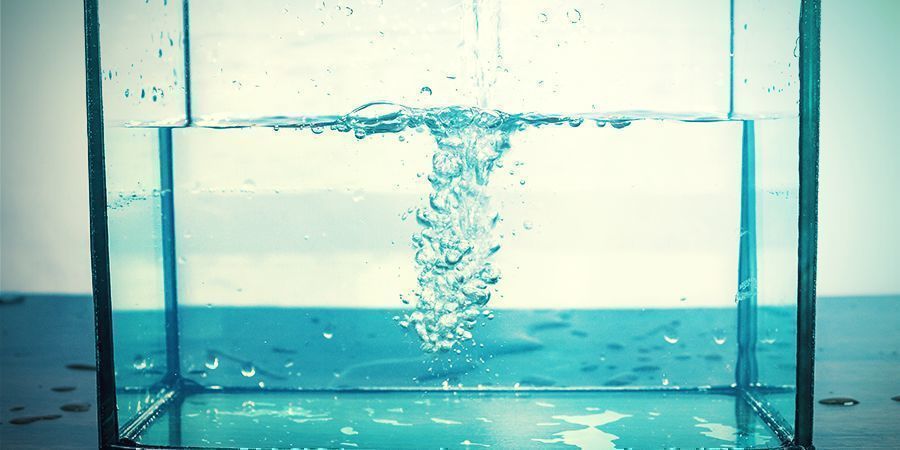
The obvious thing first: Just like you, fish are living beings. This means you want to provide an environment that keeps the fish safe, healthy, and happy.
Depending on what type of fish you plan on getting (more on that below), they will need a certain amount of space. So, you’ll need to get a tank of the proper size.
For a simple setup, a standard acrylic aquarium may well do. It’s also possible to keep the fish in other containers, such as in large food-grade containers or a barrel. Your tank doesn’t have to be fancy, as long as it provides a suitable environment for your fish.
When adding water to your tank, keep with the same practices as setting up a fish tank. First, the water needs to be dechlorinated. The simplest way to go about this is to let tap water sit for a day or two to allow the chlorine to dissipate. If your tap water contains chloramine rather than chlorine (ask your water provider), it will be more difficult to get rid of it without the aid of chemicals.
After dechlorinating, don’t throw in your fish just yet! You need to cycle (i.e. operate empty) your system for about 4–6 weeks first. This is so the beneficial bacteria in the water can build up. Otherwise, there won’t be bacteria to feed on the fish poop, and thus no nitrates for plants to consume.
You’ll also want to instal a pump. The pump will draw the water from the fish tank into the grow bed (holding plants and their roots) and back.
2. Build Your Dual Root Zone Media Bed
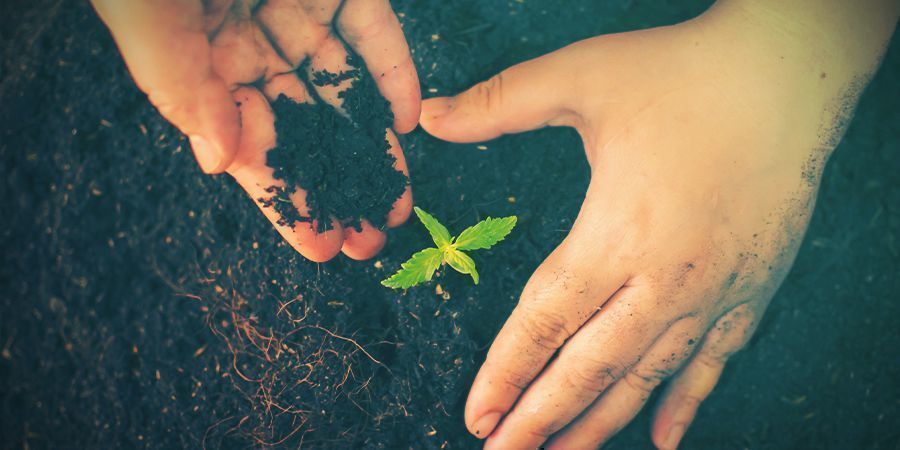
The media bed is where we will be growing our cannabis. We will instal the media bed in a flood table setup above the fish tank. A large, heavy-duty plastic tray is optimal, but you can also use a large wooden tray or similar. As we’re suspending our media bed above the tank, you'll want to set it on a sturdy stand or suitable table.
Start filling in the first layer with clay pebbles. Clay pebbles are a tried and tested growing medium popular in hydroponics. They don’t contain any nutrients by themselves, plus they are pH-neutral and won’t affect the water in the tank.
To make the dual root zone, start by adding a layer of permeable material such as burlap on top of the clay pebbles. Then, add a layer of soil on top of the burlap. This way, we create two layers; one aquatic layer at the bottom, and a terrestrial layer on top. Both will form their own ecosystems that will, in time, house beneficial bacteria for maximum natural nutrient input, improved nutrient retention, and optimal gas and water exchange.
For improved growth, you can water and feed the upper soil layer separately, and it won’t contaminate the fish water. Use an organic fertiliser with phosphate and potassium. Just make sure to keep phosphate and potassium levels low, as otherwise this may be unhealthy for the fish and bacteria.
3. Add the Fish
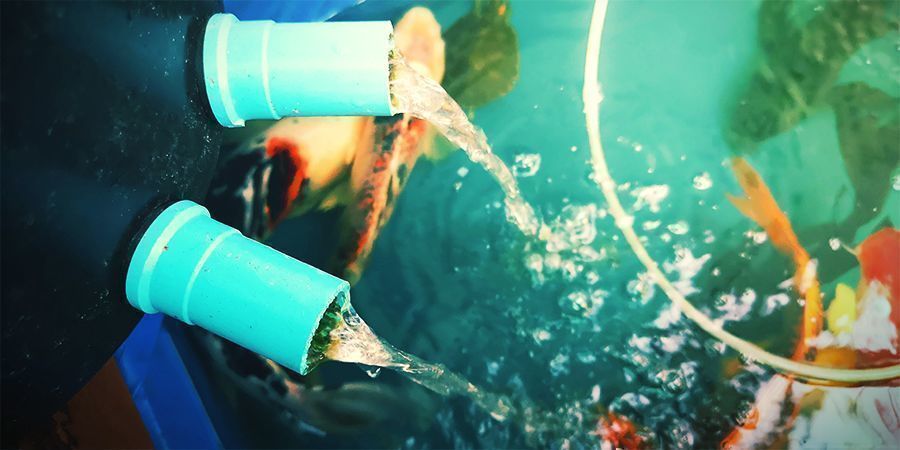
Once you've “cycled” your system for 4–6 weeks, you can add your fish.
Which fish are most suitable to use? There are a number of options that work well in an aquaponics setup. Common choices include:
- Goldfish: Goldfish poop a lot. As you can imagine, this makes them ideal for aquaponics!
- Koi: Can get pretty big. Make sure your tank can accommodate them.
- Tilapia: Very good beginner fish; easy to care for.
- Barramundi: Very popular fish for aquaponics.
- Ornamental fish: Tetras, mollies, guppies, etc. will all do great.
- Carp, trout, catfish, silver perch: They all work well.
As you can see, you have many choices when it comes to fish for your aquaponics system. Just know that not all fish “play” well with others. Large fish such as barramundi wouldn’t be the best to combine with guppies, for example, as the former may eat some of the latter.
Best Cannabis Strains for an Aquaponic System
When seeking strains for your aquaponics setup, it’s wise to look for strains that thrive in hydroponics in general. On the other hand, you are definitely not restricted to a specific group of cultivars, especially since we're taking advantage of a dual root zone setup. This means you can expect good results with a wide range of strains. Just make sure you have the space and other resources allocated for the prospective size and life cycle of your plant, and you should be good to go!
Tips for Your Aquaponics Grow
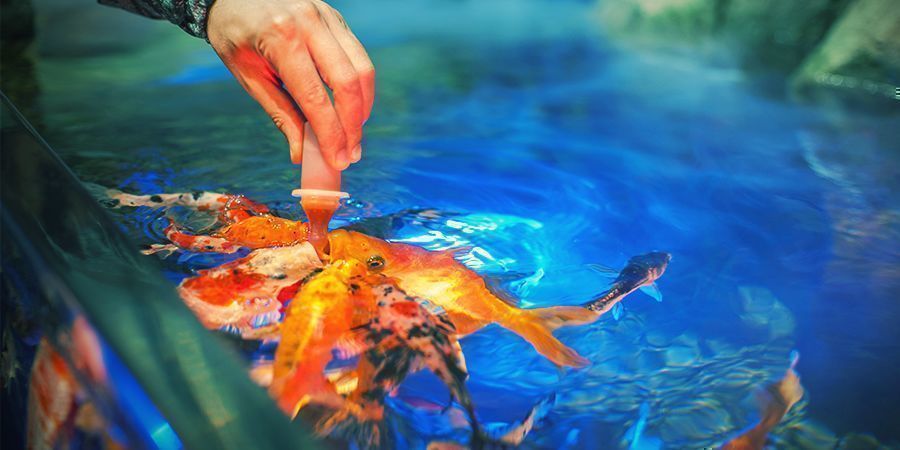
Growing hydroponically on its own already provides many advantages over other methods. One of them is that you have almost everything under your control, such as feeding and pH level. On the other hand, this also means that growing in hydro is more finicky, and less forgiving of mistakes.
Aquaponics takes it all up a notch, providing you with more flexibility than a typical hydro setup. For example, when feeding your cannabis in aquaponics, you have no less than five different options:
- You can add fish-safe nutrients directly to your fish tank.
- You can feed the fish more or less, or change the diet of your fish. More fish poop = more nutrients!
- You can add soil amendments to the soil layer of the dual root zone.
- You can feed your cannabis with liquid organic nutrients in the upper root zone.
- You can foliar spray your plants as needed.
As we said, plenty of options! The beauty of it all is that once you have everything dialled in, your aquaponics system will pretty much work on its own, with happy fish and happy plants! Isn’t that a great way to grow cannabis? We think so too!
-
 8 min
27 August 2021
How To Use Aeroponics To Grow Potent Cannabis
Aeroponics is an advanced cultivation technique used to produce all sorts of crops, and there's no reason you can't reap its benefits with cannabis. With the right equipment, knowledge, and plenty...
8 min
27 August 2021
How To Use Aeroponics To Grow Potent Cannabis
Aeroponics is an advanced cultivation technique used to produce all sorts of crops, and there's no reason you can't reap its benefits with cannabis. With the right equipment, knowledge, and plenty...
-
 5 min
18 March 2021
Should You Grow Cannabis Using Soil, Coco Or Hydroponics?
Should you grow your weed in soil, coco coir or hydroponics? Below, we take a look at the different growing media you can use to cultivate cannabis, along with their pros and cons.
5 min
18 March 2021
Should You Grow Cannabis Using Soil, Coco Or Hydroponics?
Should you grow your weed in soil, coco coir or hydroponics? Below, we take a look at the different growing media you can use to cultivate cannabis, along with their pros and cons.
-
 3 min
31 July 2020
The Different Types Of Hydroponic Systems For Growing Cannabis
Hydroponics offers growers big yields and fast results. Some methods are simple and cheap, whereas others are much more intricate and advanced. Check out the six most popular hydro methods below.
3 min
31 July 2020
The Different Types Of Hydroponic Systems For Growing Cannabis
Hydroponics offers growers big yields and fast results. Some methods are simple and cheap, whereas others are much more intricate and advanced. Check out the six most popular hydro methods below.
-
 6 min
5 March 2020
How To Grow Organic Cannabis At Home
If you want to enjoy highest quality cannabis, then it‘s going to be organic herb. But growing cannabis organically can be a challenge. We explored organic farming techniques and put together a...
6 min
5 March 2020
How To Grow Organic Cannabis At Home
If you want to enjoy highest quality cannabis, then it‘s going to be organic herb. But growing cannabis organically can be a challenge. We explored organic farming techniques and put together a...
-
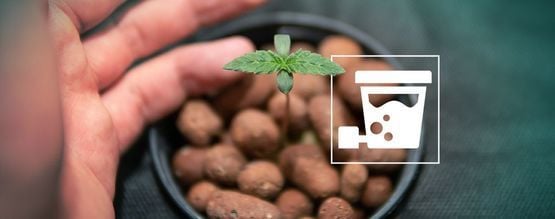 6 min
5 February 2020
How To Grow Huge Yields Of Cannabis Using DWC Hydroponics
Abundant yields in less time with fewer resources? This is the promise of growing cannabis in a hydroponic system. When it comes to deep water culture (DWC), what are the benefits and drawbacks?...
6 min
5 February 2020
How To Grow Huge Yields Of Cannabis Using DWC Hydroponics
Abundant yields in less time with fewer resources? This is the promise of growing cannabis in a hydroponic system. When it comes to deep water culture (DWC), what are the benefits and drawbacks?...
-
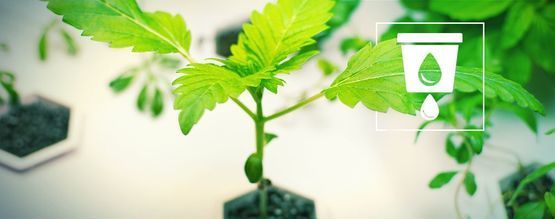 11 min
13 June 2019
Growing Cannabis With Hydro
Growing cannabis with hydroponics can really push a crop far past the natural potential. It offers many advantages to the grower willing to take on more of a challenge, and rewards hard effort and...
11 min
13 June 2019
Growing Cannabis With Hydro
Growing cannabis with hydroponics can really push a crop far past the natural potential. It offers many advantages to the grower willing to take on more of a challenge, and rewards hard effort and...
-
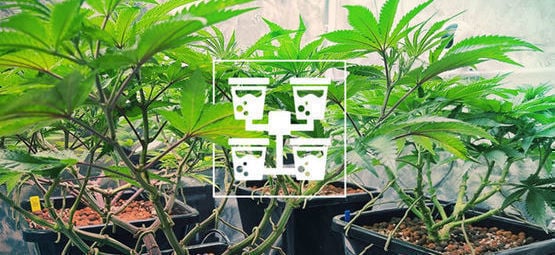 3 min
13 June 2019
Learn All About DWC And Advanced Hydroculture
Using DWC buckets is one way to set up your hydroponic grow, but there are more options for you to take when going the hydro route. Find out about the different setups, and check the major pros and...
3 min
13 June 2019
Learn All About DWC And Advanced Hydroculture
Using DWC buckets is one way to set up your hydroponic grow, but there are more options for you to take when going the hydro route. Find out about the different setups, and check the major pros and...
-
 2 min
16 December 2018
How To Make A Hydroponic System From A Soda Bottle
Want to give hydroponics a try, but don't have the resources for a big setup? No problem! DIY soda bottle hydro systems utilise everyday items to create a great environment for cannabis to grow....
2 min
16 December 2018
How To Make A Hydroponic System From A Soda Bottle
Want to give hydroponics a try, but don't have the resources for a big setup? No problem! DIY soda bottle hydro systems utilise everyday items to create a great environment for cannabis to grow....









 United States
United States













